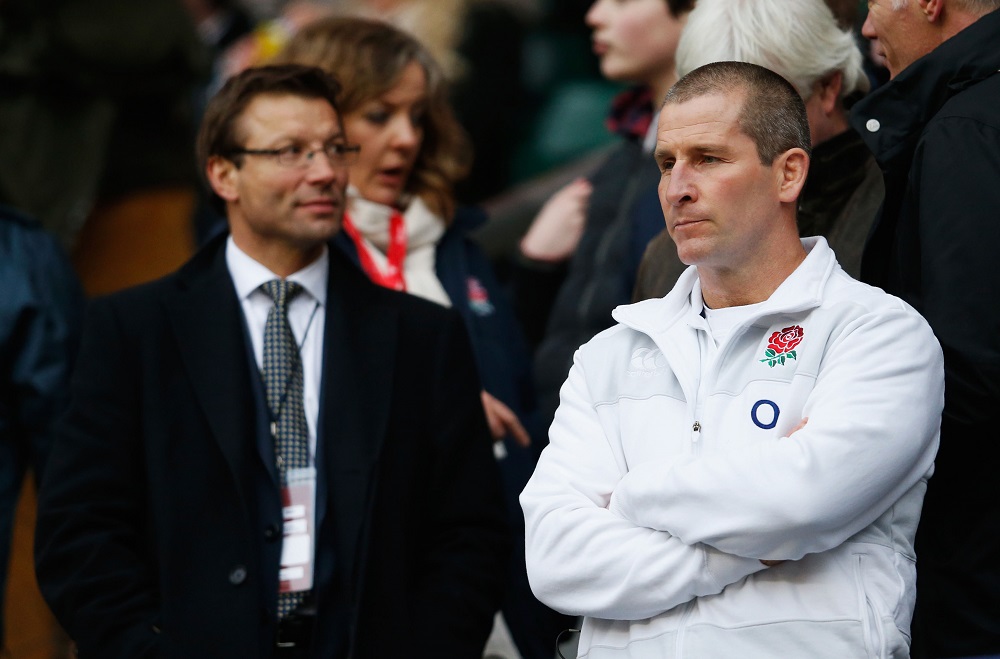Cain column: ‘Teflon Rob’ could have done so much more

(Photo: Tom Shaw / Getty Images)
By Nick Cain
ROB Andrew’s reputation as the Teflon man of English rugby may have taken a knock when he was sacked as the RFU’s professional rugby director, but he is back in non-stick mode in his newly released memoirs.
Andrew, who is now chief executive of Sussex County Cricket, uses the book to give his version of events surrounding the 2011 and 2015 World Cups, both of which saw England exit in disarray. Andrew’s testimony in Rugby: The Game Of My Life* is in both cases at odds with my own assessment of the doomed campaigns.
Andrew says that in 2011 he had grave reservations about going to New Zealand because his new post as the RFU’s professional rugby director had not yet been signed off. However, as Andrew was making the transition from director of elite rugby to his new role he was in essence still the top line-manager responsible for the England team.
You can also rest assured that during the transition there was no hiatus in him drawing down an annual six-figure salary estimated at the time to be in excess of £250,000. Therefore, he should have seen making the trip to New Zealand not so much as an optional extra but as an essential part of his brief – especially as he had already been working for the RFU for five years.
Andrew says that when he got to Dunedin the off-field implosion which wrecked England’s campaign was already underway, with players going ‘on the lash’ in Queenstown captured on social media, as well as a hotel maid making allegations of harassment.
He reserves his strongest criticism for the senior players in the squad, who he says let down manager Martin Johnson, and he singles out Mike Tindall, who had been a World Cup winner alongside Johnson when he was captain of the the triumphant 2003 side. Andrew says of Tindall, “his behaviour had not been within driving distance of acceptable”.
This begs the question why Andrew did not tell Johnson – or inform the RFU chief executive or management board – that the only way to nip the unfolding crisis in the bud was to take disciplinary action against Tindall’s binge-drinking escapade under the catch-all provision of bringing the game into disrepute.
My belief is that as Tindall’s 2003 team-mate, Johnson mistakenly felt that loyalty to his old comrade was paramount, and, as Andrew puts it, “saw it as his job to front-up in public and was reluctant to let anyone else share the load”.
It was clear that Johnson also believed that England could ride out the storm of adverse publicity without any further mishap. He could not have been more wrong. It was a classic case of trying to circle the wagons while you were being overrun, and it is why his joint Press conference with Tindall in the Southern Cross Hotel backfired.
Johnson’s defence of his player with the line, “shock, horror, rugby player drinks beer” increased the clamour, with England portrayed as a team in meltdown. Johnson and many of his squad took exception to this, and to some degree justifiably. However, what they, Andrew, and Johnson’s blinkered media communications crew, failed to realise is that the social media coverage surrounding their night out did not make them look like good ambassadors for England – and that perception is everything.
My view then, and now, is that there was a simple solution. Andrew should have used his influence and position as Johnson’s line manager to ensure that Tindall was dropped from the team for the next one or two pool matches as a disciplinary measure for breaking team protocol. Cutting him for the matches against Georgia and/or Romania would have sent the right message not just to the squad, but to the watching world.
This would have cauterised the self-inflicted wound overnight. Player transgresses, and is subject to squad discipline. End of story.
Instead, Andrew describes it as if he was a bystander watching a car crash, rather than the driving instructor who should have used his override controls to avoid it.
The same applies to his surprisingly brutal criticism of Stuart Lancaster, who he accuses of losing the plot in the 2015 World Cup.
Andrew castigates Lancaster for picking Sam Burgess, describing him as a “rogue ingredient” which created a midfield mess. He lambasts Lancaster for flogging his players in Colorado during a never-ending series of trials because he was prevaricating about his best team. He lashes Lancaster for concentrating on “extraneous matters” around culture-building rather than focusing forensically on how to turn England into world-beaters on the pitch.
During all of this Andrew air-brushes out his key role in Lancaster’s appointment. When Ian Ritchie was appointed as RFU chief executive in 2012 he acknowledged his lack of detailed rugby knowledge, and leaned heavily on Andrew, as his professional rugby director, for advice over who should succeed Johnson.
Andrew convened a number of panels at Ritchie’s behest, but consistently championed his RFU work colleague, Lancaster, despite his coaching CV lacking the heavy-duty experience required for the job. Those with tried and tested track records, like the South Africans Nick Mallett and Jake White, as well as Eddie Jones, lost interest after discovering that the deck was stacked against them.
What makes Andrew’s unbridled criticism of Lancaster so difficult to justify is that he was responsible more than anyone else for the over-promotion of an inexperienced coach – and that inexperience proved costly as England became the first host nation to be knocked out in the pool stages.
This is a Teflon memoir, but the deep scratches in the surface means that it is difficult to wipe clean.
*Hodder and Stoughton, Oct 19